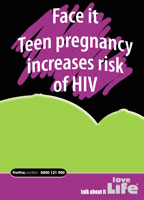Trending
Elections 2024
Jobs
- Advertising Sales Representative Barbarton
- Studio Account Manager Cape Town
- Social Media Manager Cape Town
- Advertising Sales Executive Countrywide
- Creative/Conceptual Copywriter Cape Town
- Activations Manager Johannesburg
- Copywriter and Content Producer Cape Town
- Delivery Director Sandton
- Junior Art Director Cape Town CBD
- Paid Digital Media Strategist Durban
loveLife pulls controversial billboard
 loveLife took the unprecedented step of pulling one of its current billboards that has become the subject of a contentious debate this week. The billboard, printed in four languages, was one of four creative designs aimed at getting South Africans to face up to the risk of HIV.
loveLife took the unprecedented step of pulling one of its current billboards that has become the subject of a contentious debate this week. The billboard, printed in four languages, was one of four creative designs aimed at getting South Africans to face up to the risk of HIV. The billboard "HIV loves pelegi go supa bosadi" speaks to the fact that teen pregnancy is a major factor in the infection of teenage girls. By age 21 more than one in four young women is HIV positive.
The billboard "HIV loves pelegi go supa bosadi" speaks to the fact that teen pregnancy is a major factor in the infection of teenage girls. By age 21 more than one in four young women is HIV positive.
The billboard evoked considerable discussion, but opposition from a variety of constituencies mounted. The primary concern was that the billboard has the potential to stigmatize pregnancy.
loveLife CEO Dr David Harrison says: "The purpose of loveLife's billboards is to challenge society, get people to talk about it and point to loveLife's information and counselling services."
Largely as a result of its large national billboard presence, loveLife receives more than 300 000 calls per month to its free telephone counseling service.
Harrison says: "Teenage pregnancy almost doubles the risk of HIV infection. There is considerable evidence that teenage girls after the age of 18 come under pressure to fall pregnant.
"The traditional notion that child-bearing proves womanhood plays a large part in the very high proportion of women who have a first baby before the age of 20. Obviously these women are having unprotected sex and most often with males four or five years older among whom HIV prevalence is much higher than younger men.
"Another factor is the natural inclination for young women, just out of school and most often unemployed, to look to somewhat older men for material and social security."
loveLife will replace the current billboard with one reading "Face It: Teen Pregnancy Increases Risk of HIV."
"We cannot back away from focusing on the critical drivers of HIV infection in our society", says Harrison, "but loveLife does not want to offend any sector of South African society and it seems this particular billboard has hit a number of raw nerves."
The other three billboards in the current campaign will remain, namely:
"HIV: Face it"
"HIV loves skin on skin"
"HIV loves sleeping around"
Harrison says the sexual dynamics influencing the extraordinary rate at which young women are infected with HIV between age 18 and 21 years needs further research, but certainly on the existing evidence the linkage to first pregnancy is compelling.











